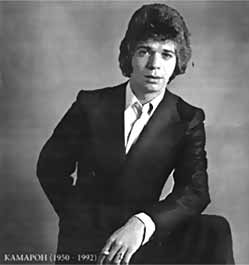October 22, 2007
Notes from Spain

Stephanie is avidly reading Giles Tremlett's Ghosts of Spain, a well written reflection on contemporary Spanish society and the reverberations from their history spoken and unspoken of, the ghosts that Tremlett refers to. She told me of the Flamenco singer Camaron de la Isla. We looked for more information in iTunes --no luck-- then Wikipedia --not enough-- for music in Amazon, then in YouTube. I don't know why we didn't go to YouTube first. The first clip was the best of a bunch of great videos:
From chapter 6 "The Mean Streets of Flamenco", page 187:
His brother recalls how, when Camar?n was still a child, the se?oritos who gathered at the Venta de Vargas would insist that he came to sing. 'After a while they always asked for Camar?n, and we all knew we would earn more money that way. I would have to crawl on to the bed above all the other sleeping bodies and prod him awake. often he would tell me that he didn't want to come.Let it grow. But talk about moths to the flame!It was the start of a story of genius and tragedy, of the first flamenco star of the media age. Just as Camar?n was often unwilling to sing for the se?oritos, so he was an unwilling star. Quiet, introverted, uuninterested in the trappings of wealth and stardom, he was a mystery to most people - even to the legion who claimed to be his friends. Rafael, my friend from Las Tres Mil, recalls meeting one of the shyest, quietest men he had ever seen: 'He would wrap his arms around his body and sink into himself when he was in company', he said. "You had to pull the words from his mouth. But he was a beautiful person.'
Camar?n de la Isla died in 1992, aged just forty-two. A concer caused by four packets of Winstons a day finished him off. Years of drug abuse, of heroin and cocaine, had already drained the sesistance out of a body that produced a sound which revolutionized flamenco. With his death, Camar?n's mythical status was ensured forever. It continues to grow.
I remember they lyrics from another video in the blogpost Tiriti Tran Tran Tran Tran, so I googled for more.

Here's what I found (the translation has lots of 'tude, so be advised):
Tiriti tran tran tran....
ditto ditto ditto
Just the cantaore's warm-up?cu?ntas veces te lo he dicho
que te miraras en ello? (or ellaaaaaao?)
How many times have I told you that you'll see yourself in [it] ???????
or...
How many times have I told you that you look like her?y te viniste a mi vera
and you came to my side (?)cuando no tiene remedio
when it couldn't be fixedque mi cari?o tunante
that my affection (something to do with living free without attachments, like a vagabond or.. Gypsy, or a little bit lecherous?)que mi cari?o truh?n
that my affection (Cheeky, or sly ... like a scammer?)cuando te vayas conmigo
when you go with meque ?d?nde te voy a llevar?
where will I take you?El sentio me da vuelta
The feeling spins me 'roundcompa?erita de mis entra?as
companion of my innards (soul?)El sentio me da vuelta
y yo me acerco a las paredes
and I move close to the walls
que ya est?n llegando a tu puerta
[because] they arrive at your doory yo me acerco a las paredes
que ya est?n llegando a tu puertaLa amapola del campo le dijo al trigo
the red flower in the field says to the wheatno me caso con nadie
I won't marry anyone
no s? contigo
if it's not with youno s? contigo ni?a
no s? contigo
La amapola del campo le dijo al trigo
Que cuando la miro llora
when I look at her she criesno s? que tiene tu mare
I don't know what your mom's problem/deal is (?)Que cuando la miro llora
That when I look at her she criesy no s? con que cosita
and I don't know [with] what [little. unimportant]thingcontemplar a esta se?ora
the woman thinks [about]Cuando va andando, canelas y rosas va derramando
when she (you? the girl, not the mother?) goes walking cinnamon and roses go spreading/sprouting (?)si yo mismo no me entiendo
if I don't understand myself?qui?n me va a entender a m??
who's going to understand me?digo que ya no te quiero
I tell you that I don't love you [anymore]y estoy loquito por ti
yet I'm crazy for youque a los titirimundis
the (wtf?)que yo te pago la entr?
I pay your [entrance fee?]que si tu gente no quiere
If your family/people don't wantque ?qu? dir?n, qu? dir?n?
what will they say?que ?qu? dir?n, qu? dir?n?
what will they say?que ?qu? tendr?n que decir?
what would they have to say?que yo te quiero y te adoro
I love you and I adore youque yo me muero por ti
[so much] that I die for you.
A note on "Notes": the title is a reference on our favorite spanish language enterprise, Ben y Maria's notes From Spain
Posted by Dennis at October 22, 2007 7:30 AM
Leave a comment